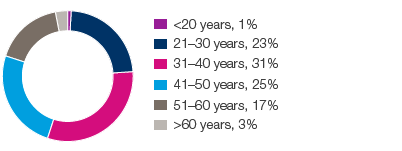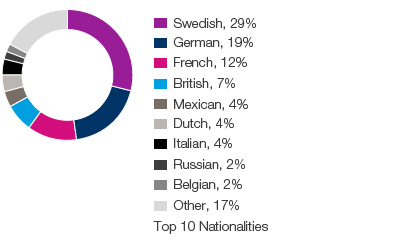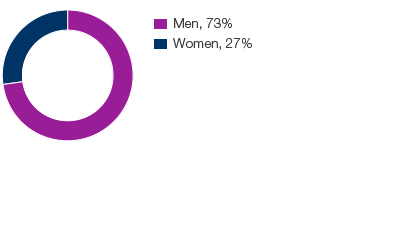Employees
SCA’s global human resource strategy aims to secure long-term capabilities and ensure that SCA is a safe and healthy workplace based on ethical business practices and perceived as a great place to work.
SCA comprises on average 46,171 (44,000, 44,247) employees in some 60 countries, of whom 31% (31, 32) are women. The employee turnover rate is 12% (11, 16).
Secure access to the right people and capabilities
SCA recruits and develops employees in line with its strategic workforce plan. This plan is based on future capability needs and demographics, and defines the strategic areas and activities SCA will focus on from an employer branding perspective.
Individual development
SCA strives to ensure that all employees have an individual development plan that is defined and followed up during annual performance reviews. The reviews identify the capabilities necessary for employees to achieve stated targets. The employees and managers agree on the manner in which these skills should be secured, primarily through internal development opportunities. The objective is to follow up the performance of every employee twice a year. In 2016, 89% (96, 89) of white-collar employees participated in performance management reviews. The corresponding number for blue-collar employees is 86% (86, 75). The performance reviews are sometimes conducted individually and sometimes in teams.
Training
In 2016, 418 people participated in the mandatory one-day onboarding program for all newly appointed leaders. 440 participated in Core 1, a six-day program to develop leaders that have been in their role for six to 12 months. 35 leaders participated in Core 2, a leadership program to develop people’s capabilities to lead in a complex environment, engage people and drive change. Creating Value and Driving Business Performance are two programs with the aim to further strengthen participants’ capabilities in strategic leadership areas. In 2016, 44 and 37 people, respectively, participated in these programs.
Other programs include the Hygiene Academy, which offers branding training, and the Digital Academy. In total, 2,464 people participated in the two programs. SCA also has sustainability training programs in place that focus on innovations, claims and communication with the aim of improving the understanding of sustainability’s impact on product and services, customers and consumers.
The average number of training hours per employee was 19 (25).
A safe and healthy workplace based on ethical business practices
SCA works proactively with employee health and well-being. Each business unit is responsible for formulating a structure for health that suits their own operations. SCA’s efforts encompass measures such as better ergonomics, quit-smoking campaigns, dietary training, support in work-life balance and advice in handling difficult illnesses.
Since 2008, SCA’s North American operation has had a health program that includes encouraging a healthy lifestyle and regular, voluntary health check-ups, as well as early identification of health risks. The European hygiene operations prioritize efforts to improve employee lifestyle and health, particularly when older employees are concerned. The goal is good health, fewer sick days and higher productivity.
Workplaces for all ages
With an ageing workforce in some markets, SCA will face new challenges since absence related to musculoskeletal problems increases with age. This insight resulted in a workplace program where technical, behavioral and organizational improvements were made to create a more ergonomic work environment and production lines. In 2015 and 2016, pilot studies were implemented at the sites in Hoogezand in the Netherlands and Neuss in Germany, including awareness training, training in ergonomics and new technical solutions. Based on the lessons learned during the pilots, a program was developed and rolled out in Germany, Sweden and the US in 2016. A global rollout for all sites will be launched in 2017.
WASH pledge
As a hygiene company, SCA wants its employees to enjoy first-class standards when it comes to workplace hygiene. To this end, SCA signed the WASH (Water, Sanitation and Hygiene) pledge in 2015. The pledge is an initiative linked to the World Business Council for Sustainable Development (WBCSD). By signing the pledge, SCA undertakes to comply with a prescribed workplace WASH standard for its wholly owned units within three years. This includes areas such as workplace sanitation and health issues, as well as training to improve employees’ awareness. By the end of 2016, 61% of SCA’s wholly owned hygiene products’ production sites complied with the standard.
Leveraging a strong winning culture
SCA carries out an All-Employee Survey every second year for employees at wholly owned companies. The latest survey was conducted in 2015, and received a response rate of 88.3% (86.3) of the workforce.
The survey covers a total of 47 aspects in nine dimensions. The results are expressed as indexes for leadership, innovation, customer orientation and engagement, as well as an overall SCA index. The SCA index for 2015 was 72 (70, 69) on a scale 0–100.
All managers are expected to prepare action plans together with their employees based on the outcome of the survey. The next employee survey will be carried out in 2018.
Diversity
Employee age distribution SCA Group 2016

Diversity is part of a winning culture. For SCA, diversity extends beyond typical attributes, such as gender and ethnicity, and we value a mix of diverse personalities, experiences and knowledge.
SCA strives for a higher proportion of women in management positions and has started several initiatives to address this. One example is “Women in IT services”, a program aimed at understanding mechanisms standing in the way of women’s career development.
In 2016, the proportion of women among SCA’s senior management* was 25% (24, 28) and 27% (29, 29) among senior/middle management*. Since 2007, the share of female managers has increased by almost 70%.
Senior management comprised 21 (28, 25) different nationalities and the corresponding figure was 32 (42, 42) for senior/middle management. Encouraging greater diversity is part of SCA’s leadership platform and succession planning.
SCA’s senior and middle management* by nationality 2016

* Senior management comprises the highest level of management group below the Executive Management Team. The number varies over time due to organizational changes and consists of 110–150 managers. Middle management consists of 750–1,000 managers.
SCA’s senior and middle management* by gender 2016

Recognized as a great place to work
The competition for talent is intense in many key markets. SCA is working on employer branding to attract, engage and retain the best talents and to deliver needed human capital to support its strategy. SCA uses research to understand its target groups’ preferences and is active on selected social media channels to reach them.
SCA has identified six “critical” and seven “challenging” markets with regards to demographics and/or competences. In every critical and challenging market, SCA has partnered with selected universities to strengthen its employer branding through focused activities. The business school ESSEC and the engineering school ENSAM in France are examples of this.
Employee relations
Transparent communication is fundamental to the trust between SCA and its employees, as well as their representatives. Employees are encouraged to raise issues relating to employment and health and safety with their line manager. SCA recognizes the right of all employees to join unions and to partake in union activities. Union involvement varies among SCA’s countries of operation, but on average 62% (64, 65) of SCA’s employees are covered by collective agreements.
The European Works Council (EWC)
The European Works Council (EWC) represents about 20,000 of SCA’s employees. SCA meets the EWC and other employee representatives on a regular basis to inform them of and discuss matters such as the Group’s performance and earnings, as well as health and safety and employment terms and conditions. The aim is to communicate changes well ahead of time.
Since 2013, SCA has also had an agreement with IndustriALL Global Union. IndustriALL represents 50 million employees in 140 countries in the mining, energy and manufacturing sectors. The organization was formed in 2012, combining several union organizations, including the International Federation of Chemical, Energy, Mine and General Workers’ Unions (ICEM), which previously represented SCA employees. The content of the agreement with IndustriALL largely coincides with the previous arrangement with ICEM. The Swedish Paper Workers Union is also encompassed by the agreement with EWC and IndustriALL.
Alternative forms of dialog
In parallel with SCA’s expansion, the Group encounters new circumstances and challenges, including challenges pertaining to its employee dialog. When there is no union representation, SCA establishes other channels where possible, such as workers’ councils.
In companies where SCA is not the sole or majority owner, efforts are made to exert an influence through the Board. The aim is to ensure that these companies also apply the principles of SCA’s Code of Conduct and thus respect each employee’s entitlement to freedom of association.
Organizational changes
The notice period in connection with organizational changes in the Group varies, but averages about five weeks. In connection with organizational changes, SCA works to support the employees affected. This is done through discussions with labor unions at an early stage and by preparing a social action plan that is adjusted to local conditions. The action plan normally includes assistance in seeking employment and/or education. Other tools include severance pay, early retirement and financial incentives for those who find new jobs before the end of the period of notice. Support services may comprise individual career counseling or administrative support.
In 2016, 669 people were affected by restructuring measures in Mexico, Brazil, Chile, France, Sweden and Spain. Out of these, 360 people were redeployed to other sites or lines, retired early or left the company voluntarily.
The closure of the baby diaper business in Mexico affected 79 people, the closure of the Osasco site in Brazil (due to a transfer to a greenfield site) affected 310 people, restructuring of the St Etienne du Rouvray and Hondouville sites in France affected 157 people and the closure of the Mediona mill in Spain affected 67 employees.
All affected employees received severance pay in line with or exceeding legal requirements.
